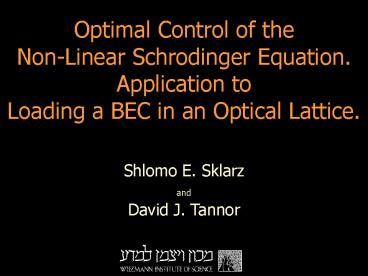Optimal Control of the PowerPoint PPT Presentation
1 / 14
Title: Optimal Control of the
1
Optimal Control of the Non-Linear Schrodinger
Equation. Application to Loading a BEC in an
Optical Lattice. Shlomo E. Sklarz and David
J. Tannor
2
Outline
- Optimal Control of BECs
- Formulation of the Optimal Control problem
- Krotov Non-Linear iterative method.
- Optimization Results
- Theoretical treatment Flat Phase Loading of a
BEC onto an Optical Lattice. - Collaboration I. Friedler, Y.B. Band, C.J.
Williams
3
Optimal Control of Bose Einstein Condensates
4
Formulation of OCT for the NLSE
- Formulation of OCT problem
- Minimize Objective
- Equation of motion
- Control K(t)Magnetic Trap Force Constant
5
Minimization under constraint
- Unconstrained objective
- cdj/dy is the well known lagrange multiplier
- Familiar example - momentum p in classical
mechanics - Additional perspective - Krotov minimum principal
Adjoined constraint
Lagrange multiplier
Original Objective
6
Krotov minimum principal
Minimizing unconstrained J yields lower bound
on minimum of constrained J.
Constrained y
7
Improvement problem
- Given an initial process (y0,u0),
- find an improved process (y,u)
- such that
- J(y,u) lt J(y0,u0)
8
Krotov Improvement Method Central point Use
freedom in choice of f(t,y) to secure current
yield.
- Choose f(t,y) such thatJy,u0 f(t,y) be
maximum at y0 gt Current y0 is the worst of
possible histories - Freely choose new u to minimize Jy,u
f. gtAny change in y caused by u can only
improve minimization
9
Choosing f(y,t) A.I Konnov V.A. Krotov, Auto.
Remote Cont. 60, 1427 (1999) Linear f
ltcygt c set to enforce 1st derivative dJ/dy00
gt dc/dt-?H/?y
10
Iterative step
11
Results of Optimization S.E. Sklarz D.J.
Tannor, PRA 66, 053620 (2002) Trap
Force-Constant is Dynamically controlled to
minimize Variance of Phase at final time.
12
Flat Phase Loading of a BEC onto an Optical
Lattice.S.E. Sklarz, I. Friedler, D.J. Tannor,
Y.B. Band and C.J. Williams, PRA 66, 053620
(2002).
- Dynamics of a BEC wave function in an Harmonic
potential - BEC Franck-Condon picture
- Thomas-Fermi Ansatz Free parameters w, b, c.
pwb - Hamiltonian Set of Eq.
- Effective Potential
13
The effect of switching on the Optical Lattice
- Complicated local structure
- Population builds up in wells.
- Tunneling between wells
- Simple global structure
- Stretched Thomas-Fermi shape
- New effective U?UnU.
14
Conclusions
1) OCT formalism derived for NLSE. 2) Concrete
OCT algorithm presented. 3) Methodology
successfully applied to physical problem Flat
Phase Loading of a BEC onto an Optical
Lattice. 4) Analytical theory developed for
obtaining a stationary flat phase
(BEC-Franck-Condon). 5) Many Applications to
systems governed by NLSE, such as soliton fiber
optics.

